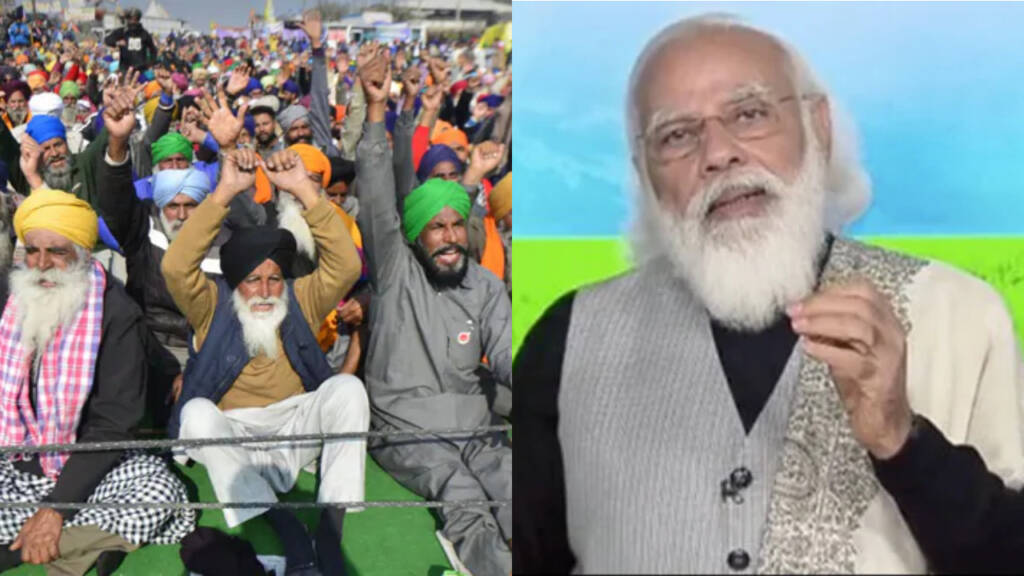Prime Minister Narendra Modi on Friday released the scheduled Rs 18,000-crore tranche to over 9 crore farmers under the Pradhan Mantri Kisan Samman Nidhi (PM-KISAN) scheme. The Prime Minister also interacted with farmers from six states and dispelled all misinformation being spread by a section of political parties and vested interest groups from within and outside India. PM Modi’s speech yesterday was no less than an address to the nation. The Prime Minister’s interaction with farmers, and releasing of funds for 9 crore annadaatas came in the backdrop of farmers and arthiyas mainly from Punjab and Haryana blocking routes to Delhi by camping at the borders of the national capital.
It must be remembered that opposition parties and vested interest groups have for months been plotting the blockade of India’s national capital. Yet, with one speech by the Prime Minister where he talks directly to farmers from across the country, the opposition’s propaganda was grandly busted. In a strong use of words, PM Modi specifically mentioned the state governments of West Bengal and Kerala for being shamelessly duplicitous and hypocritical when it comes to supporting the farmers of Punjab, yet, taking anti-farmer decisions back home.
“Those who are in Opposition today, people who have been rejected by the people India, were quiet in the past, they never spoke for the farmers. All those political parties who were rejected by people are now doing event management so that someone takes their picture and their images can be printed in the newspapers. They are issuing speeches to make headlines. The party which has said nothing in favour of Bengal farmers is coming here and speaking in favour of farmers. They destroyed Bengal, but here they want mandis,” PM Modi said.
Upping the ante against the Mamata-led state government of West Bengal, the Prime Minister remarked, “I am appalled to see that 70 thousand farmers of Bengal are deprived of this scheme that is benefitting the farmers all across the country. Bengal government due to their political motives don’t want to give this benefit to the farmers of the state. Many of the farmers from West Bengal have directly written to the Central government and expressed their sufferings while demanding that the scheme should be implemented in the state, but the Bengal government is dismissing it. There is not even one state where this scheme has not been implemented but Bengal has blocked it.”
As reported by TFI earlier, the Agriculture Produce Marketing Committee(APMC) Act, 2003 was never notified in the state. Consequently, there is no APMC mandi system under Left-ruled Kerala. Yet, the state government of the Southern state is coming out all guns blazing against the three farm laws brought in by the Modi government. Calling out the Pinarayi-regime of Kerala, PM Modi, “I want to ask them that they are in power in Kerala, then why are they not agitating in that state so that mandis may be opened in Kerala? They don’t have mandis in Kerala. If Mandis are so essential and beneficial for the farmers, they should first open them in Kerala. Why are they provoking Punjab farmers? Ahead of them, there was a party that ruled the state and they also ruled the country for 50 years, then they didn’t do a thing, now they want farmers to agitate. I want to tell them don’t play with the lives of farmers.”
Read more: Kerala has no APMC structure but farm laws, oh my god, they are ready to boycott it all
By exposing the hypocrisy of some political outfits, the Prime Minister has effectively neutralised the ongoing farmers’ protest. Further, PM Modi has made it clear that the Central Government will not yield to the demand seeking a complete repeal of the revolutionary farm laws. While the farmers of Punjab and Haryana are pursuing a maximalist stance, the government too is now cementing its position of not repealing the reforms. Prime Minister Modi is using him, and his entire council of ministers’ political capital to persist with the continuance of the farm reforms.
